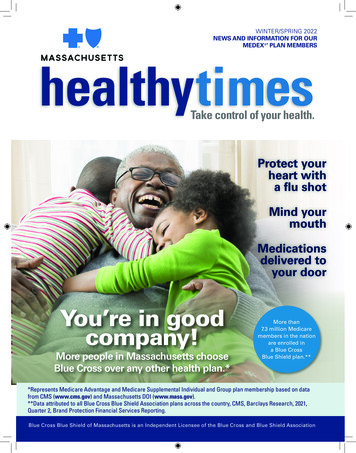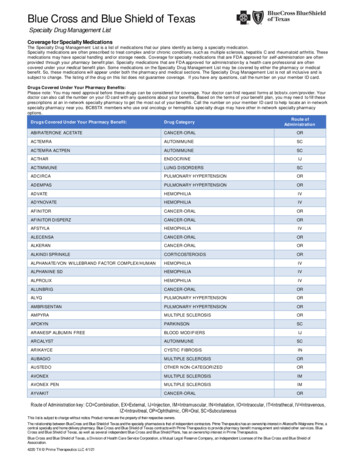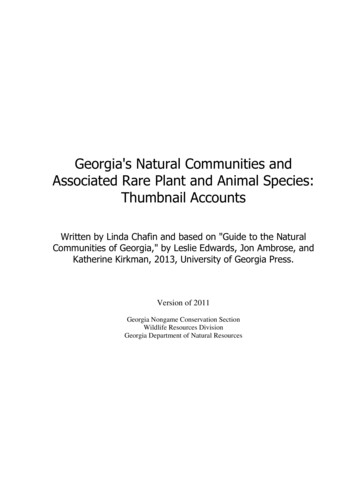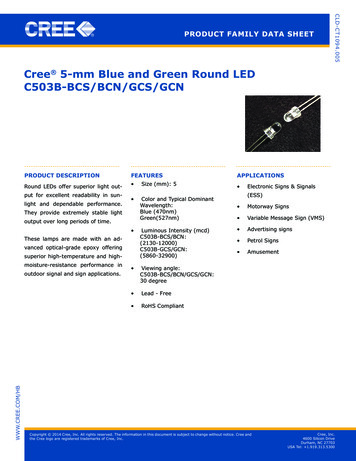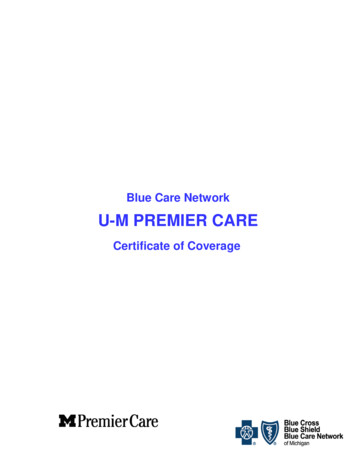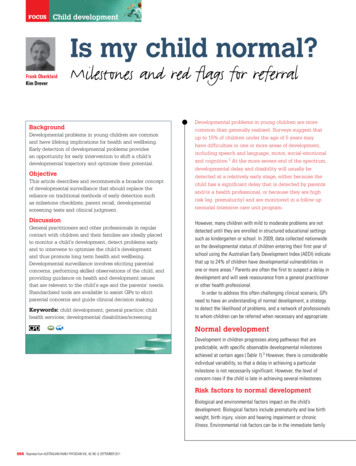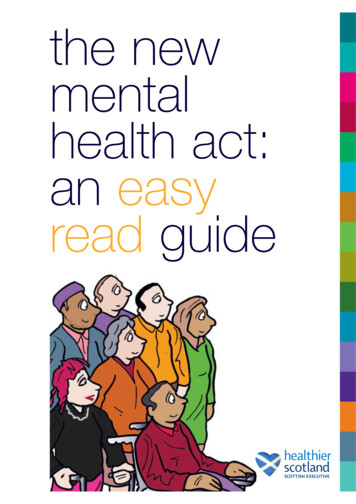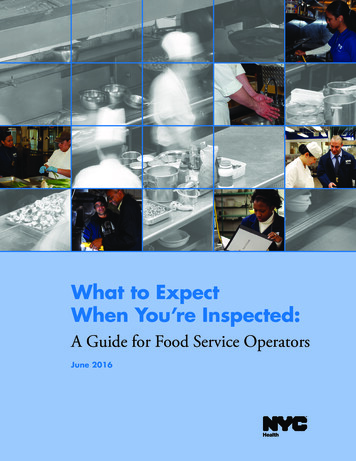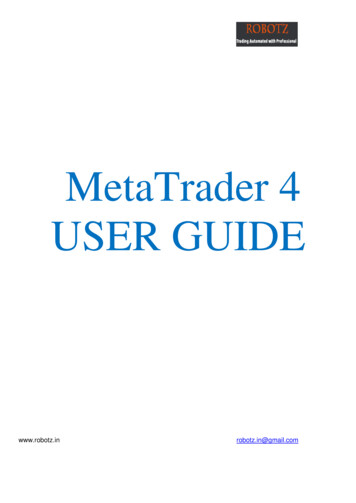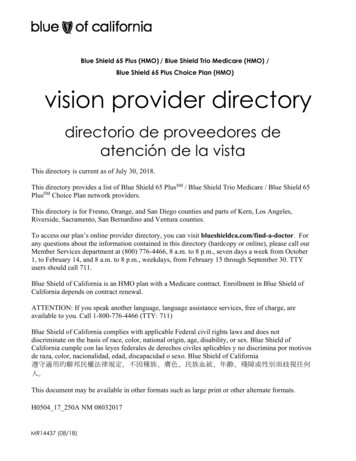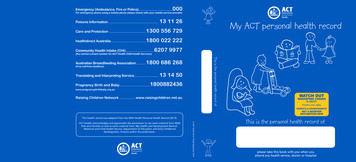
Transcription
nephoneusingusinga mobilea sareareavailableavailabletotospeakspeaktotoonona rangea ordRecord(2013).(2013).@ ACT &7 HDOWK 3ULQWHG 0DUFK Health 2018 Printed September ion.publication.
My personal health recordContentsInformationparentsanduseful contacts. 1.1Child Health forServicesandInformation.Your child’sandteeth– keepinghealthyMaternalchildhealth themservicesand.information .1.42.1Myinformationand familyInformationfor Parentsandhistoryuseful .contacts . 3.12.1Allme .3.1Myaboutinformationand family history . 3.1Familyhealthhistory and risk factors .3.2Allaboutme .3.1Familyhealth history and risk factors .3.2Notes .4.1Notes .4.1Growthcharts . 5.1Growthcharts . 5.1Girls.5.2Girls.5.2Boys .5.8Boys .5.8Birthdetails, newborn and hearing checks . 6.1details,newbornand hearing checks . 7.16.11Birth– 4 weekcheck.16 –– 48 week7.1week checkcheck. 8.1– 8 weekcheck. 9.18.146 monthcheck.46 month check .9.1. 10.1Yourchild’steeth–keepingthemhealthy.1.46 month check . 10.112 month check . 11.118 month check . 12.12 year check . 13.13 year check . 14.14 year check. 15.1Immunisation . 16.1This health record was adapted from the NSW Health Personal Health Record (2013). ACT Healthacknowledges and appreciates the permission to use some material from NSW Kids and Families as well assome material from ‘My Health and Development Record’, Maternal and Child Health Service, Departmentof Education and Early Childhood Development, Victoria within this publication.Printed SeptemberSeptember2018PrintedAugust 2016Printed2017Enquiries about this publication should be directed to Canberra Health Services, Communications Unit,GPO Box 825 Canberra City ACT 2601 or email: HealthACT@act.gov.auwww.health.act.gov.au www.act.gov.au Enquiries: Canberra 13ACT1 or 132281 Australian Capital Territory, Canberra, March 2016.This work is copyright. Apart from any use as permitted under the Copyright Act 1968, no part may be reproducedby any process without written permission from the Territory Records Office, Community and Infrastructure Services,Territory and Municipal Services, ACT Government, GPO Box 158, Canberra City ACT 2601.i
My personal health recordAccessibilityThe ACT Government is committed to making its information, services, eventsand venues as accessible as possible.If you have difficulty reading a standard printed document and would like toreceive this publication in an alternative format such as large print, pleasephone 13 22 81 or email HealthACT@act.gov.auIf English is not your first language and you require atranslating and interpreter service (TIS), contact 13 14 50.Arabic: 13 14 50 :ϢϗήϟΎΑ ϞμΗ ϢΟήΘϣ ϰϟ ΔΟΎΤΑ ΖϨϛ Chinese: 如果䓟需要翻譯,請致電: 13 14 50Croatian: Ako trebate tumaȏa, nazovite: 13 14 50English: If you need a translator, call 13 14 50Greek: ʛ ˌˆʼˀʳʽʼˈˉʼ ʻˀʼˆɤʾ ʴʸ, ˉʾ ʼˋˎ ʵˈˉʼ: 13 14 50Italian: Se hai bisogno di un interprete, chiamate: 13 14 50Maltese: Jekk gȜandek bǏonn ta 'interpretu, sejȜa: 13 14 50Persian: 131 450 ϮΧ ήϓ,Ζγ ϻ ΎϤη ή̳ Polish: JeNjli potrzebujesz téumacza, zadzwolj: 13 14 50Portuguese: Se você precisar de um intérprete, ligue para: 13 14 50Serbian: ĤŎŒ ŖŔʼnŅń ŖŗŐńśń, őńŋŒņŌŖʼn: 13 14 50Spanish: Si usted necesita un intérprete, llame al: 13 14 50Turkish: EȘLY IPY [LYJ THUH PO[P HJÛUÛa (YHTH! Vietnamese: Nңu b҅n cҋn mҽt thông dүch viên, xin gұi: 13 14 50Translating and Interpreter Service 131 450Canberra and District - 24 hours a day, seven days a weekIf you are deaf, or have a speech or hearing impairment and need theteletypewriter service, please phone the National Relay Service on 13 36 77and ask for 13 22 81.For speak and listen users, please phone 1300 555 727 and ask for 13 22 81.For more information on these services visit www.relayservice.gov.au2018Printed September2017PrintedAugust 2016ii
My personal health recordDear Parent/s,Congratulations on the birth of your new babyThis Personal Child Health Record (known as the ‘Blue Book’) is an importantbook for you and your child as it contains valuable health information that youand your child will need throughout their life. Please use it to record yourchild’s health, illnesses, injuries, growth and development.Important information will be provided to you by health professionals,so remember to take this book with you to: your maternal and child health (MACH) nurse immunisation appointments your GP, practice nurse and other health professionals your child’s specialist the hospital, including for emergencies your dentist enrol your child at day care, pre-school, or school.Not all children live with their parents, and other people may have animportant role in the care of a child. The term ‘parent/s’ used in this bookrefers to any caregivers.PrintedAugust 2016Printed SeptemberSeptember2018Printed2017Please note there are questions for parents and carersto complete on pages 3.1, 3.2 and 3.3, as well as beforeattending each child health check.iii
My personal health recordRegister your baby now – MedicareGive your child the right start.To add a newborn baby (up to and including 52 weeks of age) to yourMedicare card you will need to complete a Newborn Child Claim for FamilyAssistance and Medicare form. This form is included in the information packgiven to parents after the birth of their child, either in hospital or from aregistered midwife for a home birth. You can lodge the completed form atyour local Medicare or Centrelink centre or by mail in the reply-paid envelopeincluded in the pack.For further information, or for another copy of the form, go online care/medicare-cardMACH (Maternal and Child Health) Nursing ServiceYou may also wish to register your child with the maternal and child health(MACH) nursing serviceby calling theHealthCommunityHealth Intake(CHI) onCommunityIntake(CHI)6207 9977.You canalso phone healthCHI to makeappointmentswith02MACHTo makeall communityappointmentsphone:5124 9977nurses, for MACH nurse clinic opening times, and information on other child(including Maternal and Child Health (MACH) service)health services such as new parent groups.For further information go to: www.health.act.gov.au/machIf you need to cancel your community health(including MACH) appointment?1. Cancel on line tment/cancel-community-basedor2. Phone CHI on: 02 5124 99772018Printed September2017PrintedAugust 2016iv
My personal health recordJusthada yourbaby?It’s anowtimeto registeryour new arrival!Haveyoujust hadbaby?Registerbabynow– BirthCertificateGiveyouyourchild the right start.Didknow:It’s now time to register your new arrival: Birth registration is compulsory and it is free! Birth registrationBirth registrationis compulsoryit is free.is compulsoryand it isandfree.xYou can register online, without attending an Access Canberra Service Centre You mustYouregistermust registeryourchild’sbirthwithin6 months.within6 6months.months. You must registeryouryourchild’schild's birthbirth within You must register your child to get their birth certificate. YouYoumustregisteryouryourchildchild tocertificate.mustregisterto getgettheirtheirbirthbirthcertificate.How to register your child’s birth:Howto registeryourprovideschild’s birth:A birthcertificatelegal evidence of your child’s age, place of birthThe hospital or midwife will provide you with a Birth Registration Statementand parents’detailsandwithis requiredfor some government benefits, enrolmentSavetime and doit onlineAccess Canberra!form. Complete and either:in school and sport, opening a bank account and to apply for a passport.post to:lodgein personSimplyvisit www.act.gov.au/accessCBR andtype ‘birthregistration’ in the search field.AccessCanberraat withan AccessCanberraServiceCentreThe hospitalor midwife will orsupply youa birthregistrationform.GPOBox158Belconnen Gungahlin willstillhaveaBirthRegistrationStatementform forEnsure the form is completed and returned to the ACT Births, Deaths andyouto completeeither:CanberraACTand2601Marriages Office. The birth registration form also includes a birth certificateposttoemaillodgein personapplicationform.feefora birthcertificateapplies.Andnow fortheAbirthcertificate:Access Canberrabdm@act.gov.auat an Access Canberra Service CentreA birthcertificate provides legal evidence ofyour child’sage, place of birthGPOBox158Belconnen GungahlinOffice of Regulatory Servicesand parents’governmentbenefits, enrolmentCanberraACT details2601 and is required for someTuggeranong WodenPost:GPOandBoxsport,158, openingCanberraaCity2601and when applying for t.Andnowfor the birth certificatePhone: (02) 6207 3000AbirthtocertificateevidenceHowobtainprovidesa birthlegalcertificate: of your child's age, place of birth and parents'www.ors.act.gov.audetailsand is required for some government benefits, enrolment in school and sport,You cana chooseto applyfor a applyingbirth certifiat the same time as registeringopeningbank accountand whenfor acatepassport.yourchild’s birth.Just complete the ‘Birth Certificate Order’ section on theShopfrontlocationBirth Registration Statement form.255 toCanberraFyshwick ACT 2609Howobtain a Avenue,birth certificateAlternatively,youcan certificatechoose toatapplyfor timea birthcertificate theanyonlinetime BirthafterYoucan applyfora birththe sameas completingOfficehoursregistering Statementyour child’sYou canthisCertificateby completingthe onlinebirthRegistrationor birth.by completingthedo‘BirthOrder’ sectionon thepaperMondayFriday – 9.00amtothe4.30pmform.certificatetoapplicationform onAccess Canberra website atact.gov.au/accessCBR.You can also apply for a birth certificate any time after registering your child’s birth bycompleting the online birth certificate application form on the Access Canberra website atA fee applies for issuing a birth certificate. Current fees and processing timeswww.act.gov.au/accessCBR.are available by searching ‘birth registration’ at act.gov.au/accessCBRA fee applies for issuing a birth certificate. Current fees and processing times are available(Note: Gungahlin and Woden Service Centres are electronic payments only).by searching ‘birth registration’ at www.act.gov.au/accessCBR.PrintedAugust 2016Printed SeptemberSeptember2018Printed2017For essCBR1381.22 ll13 22v
My personal health recordThis page hasbeen left blankintentionally2018Printed September2017PrintedAugust 20161.6vi
12Child Health Servicesand InformationChild Health Servicesand InformationMy personal health record
My personal health recordInformation for parents and useful contactsChild health clinicsserviceforforMedicareand AsylumSeekercardholdersChild healthhealthclinicsclinicsprovideprovidea afreefreeserviceall parentsin the ACTwithchildrenwithtochildrenageTheyof 5 years.They areby maternalchild healthupthe ageupofto5theyears.are staffedby staffedmaternaland childandhealth(MACH) nurses who offer health, development and wellbeing checks for yourchild as well as support, education and information on all aspects of parenting.Immunisation is available by appointment at Child Immunisation Clinics across theACT, also for children up to the age of 5 years. Appointments for these clinics canbe made by phoning the Community Health Intake on (02) 6207 9977 between8am and 5pm weekdays.Other important child health professionalsYour general practitioner (GP) or family doctor is the person to seeif your child is sick, or if you have any concerns about your child’s wellbeing.A GP provides primary health care, including immunisations according to theNational Immunisation Program, referrals to specialists and, where necessary,coordinates your child’s health care.A paediatrician can provide specialist health care for your child.You need a referral from a GP to make an appointment with a paediatrician.Regular health and development checks for your childYou can take your child to the maternal and child health (MACH) at your localchild health centre, or to your GP, for health checks at each of the followingages. All of these health checks are very important as they help the nurse ordoctor track the health and development of your child and identify anypotential problems. Even if you have no concerns about their health ordevelopment, it is recommended that you should take your child to eachhealth check.PrintedAugust 2016Printed SeptemberSeptember2018Printed2017Children should be examined by a health professional at: birth 4 months 18 months 4 years 1 to 4 weeks 6 months 2 years 6 to 8 weeks 12 months 3 yearsIf you have any concerns about your child’s health, growth, development,or behaviour between these recommended health checks, please takeyour child to your maternal and child health (MACH) nurse or GP.1.1
My personal health recordEvaluation of your child’s health and developmentParents know their child best. A set of questions for parents called Parents’Evaluation of Developmental Status (PEDS) is provided for each health check,starting from when your child is 6 months old.Answer these questions as accurately as you can before each check, becausethey can help you and your GP or maternal and child health (MACH) nurseidentify concerns about the way your child is learning, developing andbehaving.You, and any health professional your child sees, should make notes aboutyour child’s health and progress in this book. There is a ‘Progress Notes’section (from pg. 4.2) where information can be recorded.Monitoring your child’s growth and developmentAll children grow and develop at different rates. It is important to monitor yourchild’s development so that any possible concerns can be identified and treatedas early as possible.Your child’s growth and development is monitored in a number of ways: by you checking your child’s milestones and answering the PEDS questionsin this book. by a health professional examining your child at regular scheduledhealth checks. through screening tests.Note: Screening tests, checks and examinations can never be 100% accurate.Sometimes a health check or screening test may suggest thereis a problem where none exists, or miss a problem that does exist.Occasionally a new problem may occur after your child has hada screening test or health check. This is why it is important to attendall recommended health checks and to complete the questions forparents in this book.2018Printed September2017PrintedAugust 20161.2
My personal health recordChild development and parentingThere are many confusing messages around for parents about how to supporttheir child’s development. To minimise this confusion a group of experts inearly childhood from across Australia produced the following 10 parenting tipsto give children the best start in life:Most of the brain’s development occurs in the first five years. How thebrain develops depends on the quality and frequency of positiveactivities, including parenting.Play Playing with yourchildren Encouraging yourchildren to playLearn Reading withyour children Counting withyour childrenPlayCareLearnTalkCare Being consistent in theapproaches you use withyour children Using established routinesfor your children aroundmeals, play and sleep times Setting clear limits for yourchildren Being physically active andeating healthily with yourchildrenTalk Being attentive to your childrenand responding to their needs Spending time talking andlistening to your childrenAdapted from A practice guide for working with families from pre-birth to eight years: EngagingFamilies in the Early Childhood Development Story 2013 Education Services Australia Ltd as thelegal entity for the Standing Council on School Education and Early Childhood (SCSEEC)1.4Printed August 2016Printed SeptemberSeptember 20172018PrintedHow much screen time for children?Not much!Screen timeincludesnot onlytelevision,but ndlimitingchildren’sdailytime.andThis isbecausereal-lifeinteractionsand othersare much better for your child’shand heldelectronicgames, withipadsyouor mobilephones.wellbeing, learning and development.It is recommendedchildrenunder twoyears shouldhave noscreentimethat:Thelatest guidelinesthatfromthe AmericanAcademyof Pediatrics(AAP)suggestat all. Children aged 2-5 years should have no more than one hour a day.children18 monthsshould haveavoidnoscreenthan video-chattingChildrenunderaged 5-18years shouldmoretime,thanothertwo hoursa day.children aged 18 months to 2 years can watch or use high-quality programs or apps ifadultswatchor playwith themto helpexperiencethem understandseeingFor screentimeto becomea learningfor yourwhatchild,they’retry watchingchildrenaged2-5 yearsshouldhavemore aboutthan onehoura dayor playingsomethingwiththemandnotalkingwhattheycan ofseescreenand time withadultswatching or playing with themunderstand.children aged 6 years and older should have consistent limits on the time they spend onelectronicand the types of media they use.Adapted reen time.html1.3
My personal health recordYour child’s teeth – keeping them healthyHealthy teeth are important for general health and speech development.Most dental problems can be prevented. Early identification of children atrisk of dental disease, and early detection of the disease, can preventwidespread destruction of the teeth and expensive dental treatmentin a hospital under general anaesthesia.When do babies’ teeth come through?UsualeruptionorderName of toothApproximate ageat eruption1,2,3,4Incisors6–12 mths5,6Baby first molars12–20 mths7,8Canines18–24 mths9,10Baby second molars24–30 mthsThe above average ages are only a guide. There is no need for concern if yourchild’s teeth come through either before or after these ages.Dental check upsIt is recommended that children begin visits to a dental clinic as early as 12months of age. The Canberra Health Services Dental Health Program providesfree dental check ups for children under the age of 5 years who live in the ACT.Please call 6207 9977 to make an appointment.Bottles and DummiesBreast milk is best for your baby. If your child is not breastfeeding: Put only breast milk, formula or water in your baby’s bottle Always hold your baby when feeding and remove the bottle when yourbaby has had enough to drink Putting your baby to bed with a bottle can cause tooth decay Honey, glycerine, condensed milk or other sticky sweet foods or liquids onyour baby’s dummy can cause tooth decay From 6 months of age most children can learn to use a cup with practice –1.4Printed September 20182017Printed August 2016at around 12 months of age replace bottles with cups10.7
My personal health recordTeething If your child is uncomfortable when teething, offer a teething ring or coldwash cloth If there are other symptoms, consult a doctor or MACH nurseFood and Drink Offer healthy food for meals and snacks from around 6 months of age Leave baby foods unsweetened Tap water (boiled then cooled until 12 months of age) is the best drinkin-between meals and at bedtime Keep treats, sweet snacks, and sweet fizzy drinks for special occasions only No honey before 12 months of ageToothbrushing Tips Keep your own teeth and gums clean and healthy. Germs from your mouthcan pass over to your baby’s mouth on dummies, bottles and spoons As soon as your child’s first teeth appear, clean them using a child sized softtoothbrush, but without toothpaste From 18 months of age clean your child’s teeth twice a day with a smallpea-sized amount of low fluoride toothpaste. Use a child sized softtoothbrush; children should spit out, but not swallow, and not rinse Toothpaste may be introduced earlier, basedon the advice of either a health professionalwith training in oral health or an oral healthprofessional An adult should apply toothpaste for childrenunder 6 years of age and store toothpasteout of the reach of children From around 3 years of age children can dosome of the tooth-brushing themselves, butthey still need an adult’s help to brush theirteeth until they are around 7 to 8 years of age10.8brush off. Seek professional advice as soonas possible.Printed August 2016Printed SeptemberSeptember 20172018Printed Watch for early signs of tooth decay – white or brown spots that don’t1.5
My personal health recordChild SafetyMany childhood injuries and accidents can be prevented. For safety tips,information and more child safety resources, go to www.kidsafeact.com.auA few important safety concerns are:For infantsFor toddlers 12 months to 3 years rolling off a change table,bench or bed. drowning in baths, unfencedswimming pools and spas. choking on a small item. running onto the road withoutlooking. scalding caused by a hot drinkbeing spilled over the child. ingesting poison or an overdoseof medication. falling from a caregiver’s arms. unsafe sleeping practices. being hit by vehicles in driveways. choking on small items and foods. ingesting poisons, medications andhousehold detergents that werepreviously out of reach. burns caused by heaters and fires.For children 3 to 5 years falling from a bicycle, scooter,playground equipment or in thehome. falling out of a highchair, shoppingtrolley or pram or falling down stairs. falling from windows and balconies. dog bites. jumping off furniture and runninginto sharp objects. scald injuries. falling from playground equipment. falling from windowsand balconies. being hit by vehiclesin driveways. scalding caused by a child turningon the hot tap in the bath or pullingsaucepans down from the stove.1.6Printed September 20182017Printed August 2016 unsafe sleeping practices. drowning in baths, in nappy buckets, dog bites.unfenced swimming pools and spas.1.3
Maternal & ChildHealth (MACH)ServiceMACH NURSES PROVIDE: First home visits for newborns Drop in clinics – short consultations Booked appointments – longer discussions anddevelopmental checks Immunisation clinics by appointment Early Days Groups– feeding, sleeping & parentingsupport in the first 3 months New Parent Groups Sleep Groups – children & babies over 3 monthFor clinic and group schedule times visit ACT Health ealth-machPrinted SeptemberSeptember 20172018PrintedThese services are free for Medicare and Asylum Seekercard holders620799779977Community Health Intake 5124Monday to Friday 8.00 am–5.00 pm
Printed September 20185124 9977
Information forparents anduseful contacts2Information forparents anduseful contacts1My personal health record
My personal health recordUseful ContactsEmergency telephone numbers are listed on the back cover of this book.PrintedAugust 2016Printed ct DetailsACT Health Dental Health Program6207 9977 (CHI)Australian Breastfeeding Association (ABA)1800 686 268 (free call)Calvary Hospital6201 6111Calvary John James Hospital6281 8100Canberra Afterhours Locum Medical Service1300 422 567 (1300 4 CALMS)Canberra Hospital5124 0000Care and Protection Service1300 556 729Child Development Service6205 1277Child and Family Centres6207 0120 (Gunghalin)6207 8228 (Tuggeranong)6205 2904 (West Belconnen)OnelinkChild, Youth and Family Gateway1800 176 468 (free call)Community Health Intake (CHI)6207 9977Domestic Violence Helpline6280 0900Healthdirect Australia (24 hours)1800 022 222 (free call)Karitane Careline1300 227 464 (1300 CARING)Kidsafe (ACT)6290 2244Lifeline ACT (24 hours)13 11 14(calls from mobiles are free)Maternal and Child Health Nurses6207 9977 (CHI)Mental Health Crisis Line
Congratulations on the birth of your new baby This Personal Child Health Record (known as the 'Blue Book') is an important book for you and your child as it contains valuable health information that you and your child will need throughout their life. Please use it to record your child's health, illnesses, injuries, growth and development.
